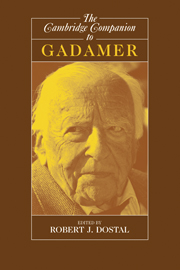Book contents
- Frontmatter
- Introduction
- 1 Gadamer
- 2 Gadamer’s Basic Understanding of Understanding
- 3 Getting it Right
- 4 Hermeneutics, Ethics, and Politics
- 5 The Doing of the Thing Itself
- 6 Gadamer on the Human Sciences
- 7 Lyric as Paradigm
- 8 Gadamer, the Hermeneutic Revolution, and Theology
- 9 Hermeneutics in Practice
- 10 Gadamer’s Hegel
- 11 Gadamer’s Relation to Heidegger and Phenomenology
- 12 The Constellation of Hermeneutics, Critical Theory, and Deconstruction
- Bibliography
- Index
9 - Hermeneutics in Practice
Gadamer on Ancient Philosophy
Published online by Cambridge University Press: 28 May 2006
- Frontmatter
- Introduction
- 1 Gadamer
- 2 Gadamer’s Basic Understanding of Understanding
- 3 Getting it Right
- 4 Hermeneutics, Ethics, and Politics
- 5 The Doing of the Thing Itself
- 6 Gadamer on the Human Sciences
- 7 Lyric as Paradigm
- 8 Gadamer, the Hermeneutic Revolution, and Theology
- 9 Hermeneutics in Practice
- 10 Gadamer’s Hegel
- 11 Gadamer’s Relation to Heidegger and Phenomenology
- 12 The Constellation of Hermeneutics, Critical Theory, and Deconstruction
- Bibliography
- Index
Summary
For Hans-Georg Gadamer, ancient philosophy consists, first and foremost, of the writings of Plato and Aristotle. As he points out in the lectures he gave on The Beginning of Philosophy, they left us the first complete texts. What we know of the “presocratics” is derived from fragments, many taken (out of context) from the texts of Plato and Aristotle. The meaning of these fragments can be determined, Gadamer argues, only by looking at them in their context, both textual and historical. To discover the “beginning of philosophy,” Gadamer thus insists that we must proceed through a study of the writings of Plato and Aristotle. Because Aristotle was a student of Plato who, despite his criticisms of his teacher, perpetuated the Platonic method of investigating things through logos, we must begin, indeed, primarily with Plato.
That is what Gadamer himself did. His first book, entitled Plato’s Dialectical Ethics, was primarily a study of the Philebus. From the very beginning, Gadamer announced, he was interested in Plato’s philosophy as it speaks to us today (PDE 7). Writing directly under the influence of his teacher, Martin Heidegger, Gadamer thought that he was able to recapture the original experience of philosophy by reading the dialogues – the equivalent as it were, in Edmund Husserl’s terms, of returning to the things themselves. As a result, even though Gadamer’s understanding of some important aspects of Plato’s philosophy changed (particularly with regard to Plato’s relation to Aristotle), Gadamer continued to find the first and perhaps purest expression of the character and grounds of his own work in Plato.
- Type
- Chapter
- Information
- The Cambridge Companion to Gadamer , pp. 201 - 224Publisher: Cambridge University PressPrint publication year: 2002

